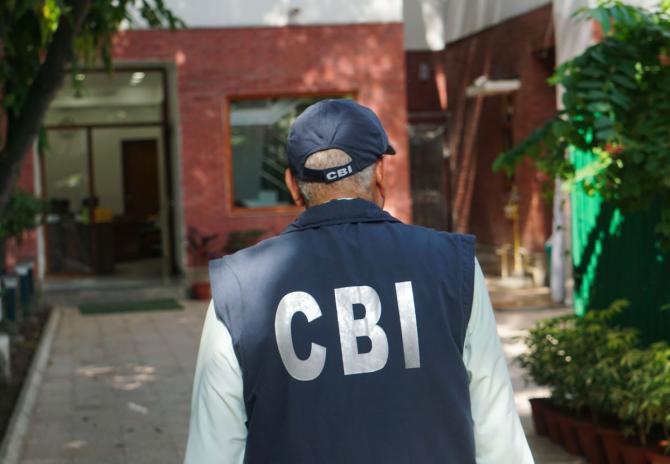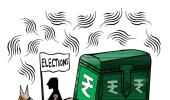Observing that politicians do not have ”higher immunity”, the Supreme Court on Wednesday refused to entertain a plea by 14 political parties led by the Congress alleging arbitrary use of central probe agencies against opposition leaders, asserting that laying down guidelines without facts of a criminal case will be a ”very dangerous” proposition.

A bench of Chief Justice D Y Chandrachud and Justice J B Pardiwala expressed disinclination to entertain the petition, saying courts are always there for taking up the grievances of political leaders as they do for common citizens.
”I think that in the absence of the specific fact, for us to lay down the general principle of law is again a very dangerous proposition. Once we have the facts in a case or group of cases then we can lay down law not just for that case but as a general principle,” said the CJI while refusing to entertain the plea.
”The difficulty in your petition is that you are trying to extrapolate the statistics into binding legal guidelines which effectively would apply. You are aware of the fact these statistics pertain only to politicians. At the same time you are aware of the fact that the guidelines cannot apply only to the politicians. Politicians do not have higher immunity,” the bench said.
Sensing its disinclination, senior advocate A M Sighvi, appearing for the political parties, sought permission to withdraw the petition which was granted.
”Learned counsel seeks permission to withdraw the plea at this stage. The petition is accordingly dismissed as withdrawn,” the bench ordered.
The bench said it is always willing to take up ”a single case or a group of cases” where a political leader has been targeted to silence the voice.
”Come to us with one or more cases together we will certainly deal with this,” the bench said.
It said the remedy to the allegation that the space for political opponents has shrunk lies in the ”political space” itself and not in courts.
The top court was not in agreement with the submission that in cases which do not relate to bodily injuries and provide for a sentence of not more than seven years pre and post-arrest guidelines needed to be framed.
For arrest and remand, the political parties have been seeking adherence to the triple test which deals with the ”determination as to whether a person is a flight risk, whether there is a reasonable apprehension of the tampering of evidence, or the influencing/intimidation of witnesses”.
At the outset, Singhvi referred to certain statistics while trying to drive home the point that opposition leaders have been targeted by federal investigative agencies from 2014 to 2022 and that there has been a 600 per cent increase in CBI and ED cases.
”Between 2014 and 2022, 121 political leaders have been probed by the Enforcement Directorate out of whom 95 per cent are from opposition parties,” he claimed.
The Narendra Modi government first came to power in May 2014.
The CBI has probed 124 political leaders and out of these, 108 are from opposition political parties, Singhvi claimed.
The bench observed, by and large, the conviction rate in India is ”abysmally low” and asked whether it can say there should not be any investigation keeping in mind the statistics.
”Your statistics are there and there is no question with that...this is the petition filed by 14 political parties. Now you give us some statistics and can we therefore say that because of these statistics there should be no investigation and there should be immunity from the investigation,” the bench observed.
It then referred to the principle of equality and gave an example of press freedom, while asserting the fundamental right is equal for all.
”Ultimately even the press has no higher freedom than what is available to a common citizen under Article 19 (1) (a) (freedom of speech and expression) of the Constitution. A political leader is also basically a citizen and therefore as citizens we all are amenable to the same law,” it said.
The court said as the parties have conceded that political leaders do not enjoy immunity like other citizens, it cannot pass general directions.
”Take a case which does not involve the threat of bodily harm. Day-in and day-out, we get cases of financial scams. Somebody takes away 10 thousand crores, five thousand crores from retired pensioners or from ordinary middle class people and does not refund the amount ... No payments are made. Complaints are filed. Usually, the FIRs are filed and then a case is filed for clubbing of the FIRs. We deal with it,” the CJI said.
The court said these cases are of financial scams and provide for lesser offences, and asked if it can pass an order that there will be no arrest.
”Once we accept that the political leaders stand absolutely on the same footing as the citizens of the country and they are entitled to the same protection of the due process of law then we cannot say that they are entitled to higher immunity,” the court said, adding it cannot do what essentially lies in the domain of the legislature.
These statistics pertain only to politicians and hence general guidelines cannot be passed, it said. If an ordinary citizen is arrested for putting out a tweet and some cartoon, then it can be understood that he has no access to the top court, the bench said. ”Political leaders cannot say this,” the CJI said.
On the issue of shrinking of space for political differences, it said, ”That is the problem with your formulation. When you say that the space for the opposition has shrunk then the answer to this lies in political space itself not in the court.”
The bench said the guidelines sought to be issued may result in a situation where a police or ED officer will have no discretion to make an arrest.
Singhvi said he was not seeking any particular relief in a particular case and the parties, which represent 42 per cent of the electorate in the country, wanted prospective guidelines of pre and post-arrest procedures to be adopted by the central probe agencies.
Earlier, the joint plea was mentioned for urgent hearing on March 24 by Singhvi.
The plea alleged there has been an alarming rise in the use of coercive criminal processes against opposition political leaders and other citizens exercising their fundamental right to dissent.
Besides the Congress, the parties to the petition included the Dravida Munnetra Kazhagam, Rashtriya Janata Dal, Bharat Rashtra Samithi, Trinamool Congress, Aam Aadmi Party, Nationalist Congress Party, Shiv Sena (UBT), Jharkhand Mukti Morcha, Janata Dal-United, Communist Party of India, CPI-Marxist, Samajwadi Party and the J&K National Conference, the statement said.










